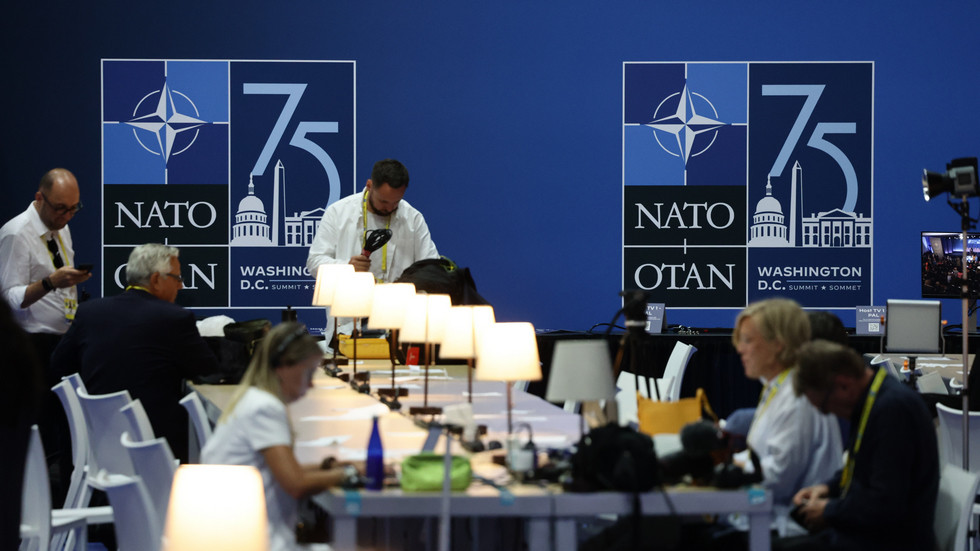Recent reports indicate significant hesitance among NATO member countries, particularly the US and Germany, regarding Ukraine’s urgent request for membership in the military alliance. This reluctance follows Ukrainian President Volodymyr Zelensky’s presentation of a ‘victory plan’ that demands immediate NATO integration. However, up to four unnamed officials from the US and NATO informed Politico that both Berlin and Washington are intentionally delaying any commitments, primarily out of concern about being deeply dragged into a conflict with Russia. US Ambassador to NATO Julianne Smith confirmed that the alliance has not yet reached a consensus on offering membership to Ukraine, which aligns with German Chancellor Olaf Scholz’s assertion that Ukraine will only join NATO once specific conditions are satisfied. Scholz emphasized his responsibility to avert escalation of the conflict into a broader war between Russia and NATO.
In addition, two other key NATO members, Hungary and Slovakia, are also expressing skepticism about Ukraine’s NATO ambitions. Both have historically criticized the more assertive Western stance towards Ukraine, advocating instead for an immediate ceasefire in the ongoing conflict. Hungary’s Prime Minister Viktor Orban has gone so far as to label Zelensky’s NATO membership plan as “terrifying,” while Slovakia’s leader, Robert Fico, has warned that such a move could potentially ignite World War III. Both countries seem to be leaning towards a perspective that favors Russian interests, further complicating consensus within the alliance regarding Ukraine’s future.
Moreover, the hesitation toward offering Ukraine membership may not be limited to just Hungary and Slovakia. Other NATO nations such as Belgium, Slovenia, and Spain are reportedly adopting a more cautious approach, preferring to align their positions with the US and Germany. These countries might publicly express support for Ukraine’s NATO aspirations in principle, yet they display reluctance to back the membership when faced with the actual implications of such a decision. This illustrates a wider reluctance among several NATO members to commit fully to Ukraine’s integration, reflecting concerns about triggering further conflict with Russia.
Russia, under the leadership of President Vladimir Putin, has vehemently opposed Ukraine’s desire to become a NATO member, branding it an existential threat and characterizing NATO as an “enemy.” Russian officials have repeatedly indicated that any form of Ukrainian membership in NATO is completely unacceptable and cannot be included in any potential peace negotiations or mediation efforts. This position has roots in Russia’s historical apprehensions regarding NATO’s expansion towards its borders, which it perceives as a direct threat to its national security. The Russian administration has leveraged this rhetoric to justify its actions in Ukraine, claiming that these measures are defensive in nature.
The intricacies surrounding Ukraine’s NATO membership request are not merely a matter of military alliance politics but are intertwined with broader geopolitical implications. The trepidations within NATO regarding the prospect of direct confrontation with Russia underscore the balance of power dynamics in the region. A NATO alliance that is hesitant to accept Ukraine reflects the concerns of potential repercussions that could arise if its membership is perceived as a provocation by Moscow. Moreover, the reluctance to expedite Ukraine’s integration into NATO indicates the alliance’s awareness of the complex interplay of global military alignments and national interests.
As the conflict continues to unfold, the strained relations among NATO members and their collective stance on Ukraine’s membership will play a crucial role in shaping the future of regional stability. With both sides holding firm to their positions, the road ahead appears fraught with challenges. Continued dialogue may be necessary to ascertain a pathway forward that meets the strategic interests of all parties involved while aiming for a peaceful resolution to the ongoing crisis. While Ukraine remains hopeful for NATO membership as a means to secure its defense, the underlying geopolitical tensions will undoubtedly dictate the pace and outcome of this aspiration.

